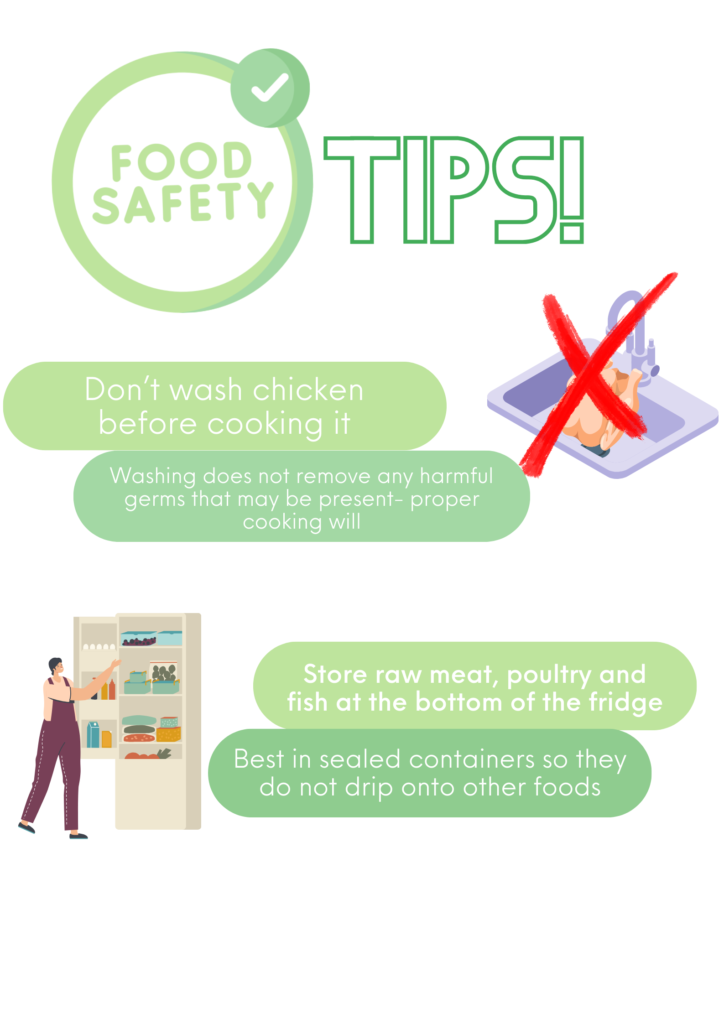Food poisoning is one gift that we would all prefer not to give or receive this Christmas. Food can unknowingly be contaminated with bacteria or viruses which can cause gastrointestinal illness, and given the busy time of year, it can be easy to forget the importance of storing and preparing food safely in order to minimise harm. Many people are unaware of common kitchen habits that can put us at greater risk of spreading bacteria causing gastrointestinal illness. Put your knowledge to the test with the Food Standards Scotland online quick quiz found here: Kitchen Crimes | Avoid common mistakes | Food Standards Scotland
NHS Shetland Health Protection Nurse, Chloe Umphray said:“Campylobacter is one of the most common bacteria causing food poisoning and it is closely associated with raw poultry such as chicken or turkey. For most foods, washing them is an important part of food preparation however, washing raw poultry in your kitchen sink is not recommended as it can actually increase the risk of bacterial spread onto kitchen surfaces. Another handy tip is to store raw poultry products on the bottom shelf of the fridge to avoid the chance of it dripping down onto other fridge items.
“If you are having a traditional turkey or other poultry roast at Christmas then it is really important to properly defrost before cooking thoroughly. Food Standards Scotland webpage has a helpful “Turkey Cooking Guide” although the advice also applies to other poultry: How to cook turkey safely | Food Standards Scotland.
This year in particular, many of us may be economising, reducing waste and therefore trying to use up all of the leftovers. Chloe added: “It is very important that we do this safely by storing and reheating food according to advice. Storing food incorrectly and for longer than recommended can increase the risk of bacterial growth which can lead to food poisoning. Key safety tips include: store it in the fridge, eat it within two days and only reheat it once.” Further information can be found here Food Date Labelling | Food Standards Scotland.
There are many other bacteria and viruses that can cause food poisoning and, although they may be less common, they can cause more severe problems for some groups of people. Pregnant women and those with weakened immune systems or other underlying health conditions should take extra precautions to reduce the risks. Some foods have greater potential to carry harmful bacteria such as chilled, cured meat and fish; raw fish or shellfish products; cold pre-cooked meat or shellfish; soft mould-ripened cheese or pate. When any of these products are stored incorrectly this can allow the bacteria to grow and therefore increase the risk of harm. Those people in the most “at-risk” groups should avoid eating the highest-risk foods and consider safer alternatives where possible. Further information can be found on the Food Safety Standards website here: Causes of foodborne illness | Food Standards Scotland | Food Standards Scotland In most circumstances, if you or a family member experience gastrointestinal illness caused by food poisoning, symptoms should usually resolve after a few days. It is important to keep hydrated, eat small amounts of bland foods and stay off work or school until you feel better and for at least two days after the last episode of vomiting or diarrhoea. In some circumstances you may need to speak to a GP for advice, please refer to NHS Inform website for further guidance here: Food poisoning | NHS inform.
Written by Chloe Umphray – NHS Shetland Health Protection Nurse. Dec 23
